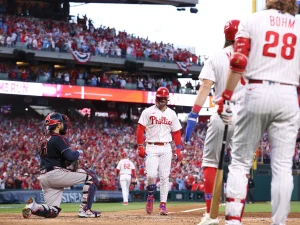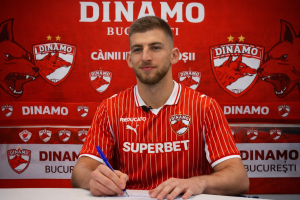
In a stunning twist that has the baseball world buzzing, the Philadelphia Phillies are reportedly pursuing a massive $100 million deal for a star relief pitcher during this off season’s free agency. Known for being aggressive in the market, the Phillies are once again making waves, this time linked to one of the most expensive bullpen signings in MLB history.
If the deal materializes, it would not only be one of the priciest contracts ever for a relief pitcher, but it would also signal the Phillies’ intent to go all-in on winning a World Series after coming tantalizingly close in recent seasons.

The Need for an Elite Reliever
While the Phillies have built a formidable roster anchored by superstars like Bryce Harper, Trea Turner, and Zack Wheeler, their Achilles’ heel in recent seasons has been the bullpen. Blown saves and inconsistent late-inning performances have haunted them during key stretches, and even in their recent playoff runs, the lack of a shutdown closer has been evident.
After another deep playoff run in 2023 that fell short of the ultimate goal, Phillies management seems ready to address this glaring issue once and for all by going after one of the elite arms available in free agency. The rumored target? A top-tier closer with an impeccable track record, likely someone like Josh Hader or Edwin Díaz, both of whom are known for their electric stuff and ability to dominate in high-pressure situations.
A Shocking Price Tag
The eye-popping $100 million figure has left many analysts questioning whether such an investment in a reliever is wise. Traditionally, long-term, high-dollar contracts are reserved for starting pitchers, position players, or once-in-a-generation talents. Relievers, even great ones, are often seen as more volatile, with shorter primes and higher injury risks.
However, the Phillies seem willing to defy convention. Given the team’s history of aggressive spending and their current championship window, the front office may feel that a premier closer is the final piece needed to push them over the top. And with the bullpen’s glaring issues, it’s clear that Phillies brass is prioritizing the need for a lockdown arm that can close out games in the postseason.
If the contract hits the speculated $100 million mark, it would dwarf previous records for relievers. To put it into perspective, the largest contract for a reliever in MLB history is the five-year, $86 million deal signed by Aroldis Chapman with the New York Yankees in 2016. Blowing past that record would send shockwaves through the league and redefine how teams value elite bullpen arms.
A Risky Gamble?
While the prospect of landing a star closer is exciting for Phillies fans, there are valid concerns about the longevity of such a deal. Relievers are notorious for fluctuating performances. The wear and tear of pitching high-leverage innings can lead to injuries or sharp declines in effectiveness, as seen with many big-name closers in recent years.
For a reliever like Hader or Díaz to command a deal nearing $100 million, the expectation would be that they continue to dominate over the next five to six years. However, history suggests that many relievers see a dip in performance as they hit their early 30s. The Phillies would be banking on not only immediate success but sustained dominance over the life of the contract—a risky bet for any team.
Championship Window
The motivation behind this bold pursuit is clear: the Phillies are in win-now mode. After narrowly missing out on a World Series title in recent seasons, Philadelphia’s front office understands that their current roster, led by MVP candidates like Harper and a deep rotation, is built to compete at the highest level. The addition of an elite closer could be the final piece that pushes them over the hump and brings home their first championship since 2008.
Phillies president of baseball operations, Dave Dombrowski, is no stranger to making blockbuster moves. His track record includes assembling championship-caliber teams, and he’s clearly not afraid to spend big if it means bringing a title to Philadelphia.
The Market Reaction
News of the Phillies’ rumored interest in such an expensive reliever has caused a stir among rival teams. While some general managers believe that a $100 million contract for a closer would be a reckless overspend, others see it as a signal that the market for relievers is shifting. With the increasing importance of bullpen depth in today’s game, particularly in the postseason, teams may start rethinking how they allocate resources to the back end of their pitching staffs.
Fans of other teams are likely bracing themselves for potential bidding wars as the Phillies’ interest drives up prices. Elite relievers like Hader and Díaz could now be looking to leverage Philadelphia’s rumored offer into similar mega-deals elsewhere.
What This Means for the Phillies
If the Phillies do sign a reliever to such a blockbuster contract, they would be making one of the most aggressive bullpen investments in baseball history. On paper, adding a dominant closer would significantly bolster their chances of contending for a title over the next few years. However, the high financial commitment would also bring pressure for immediate results.
For the fans in Philadelphia, a city known for its passionate and demanding sports culture, this move could solidify their belief that the franchise is doing everything in its power to bring home another World Series. But with such a large investment, the Phillies will need the reliever to live up to every dollar of that jaw-dropping contract.
Conclusion
The Phillies’ pursuit of a $100 million reliever would be an unprecedented move in baseball. It speaks to their desperation to fix a long-standing bullpen issue and their belief that a championship is within reach. Whether this gamble pays off or backfires will depend on the reliever’s ability to stay healthy and perform under the weight of such a monumental deal. For now, the baseball world watches in anticipation as Philadelphia tries to break open its championship window with a stunning free agency splash.







